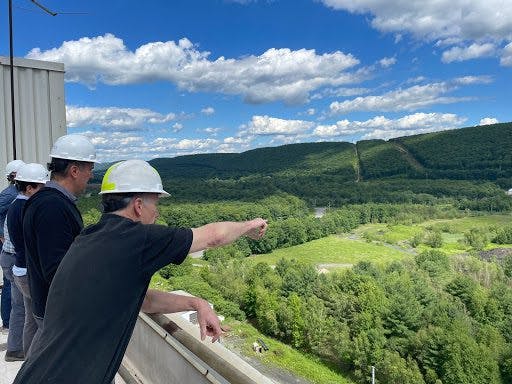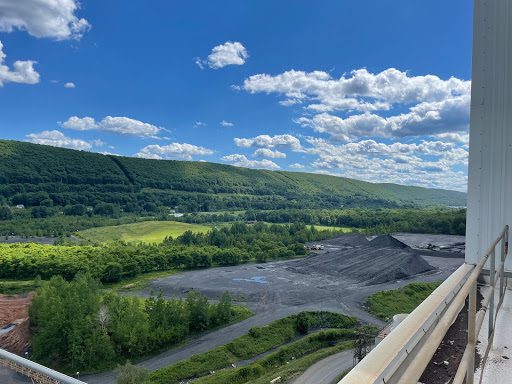Stronghold Digital Mining Raises $74M, Plans to Buy Second Power Plant
Pennsylvania-based company that reclaims coal waste as a way to power bitcoin mining sees bitcoin as the vehicle to do urgently needed environmental cleanup.

The stronghold team surveys the site of its new Panther Creek Plant in Carbon County, Pa.
- About $40 million of the investment came from WhiteHawk Capital Partners, a private credit investment management company, and the remaining $34 million was financed by Arctos Credit, an affiliate of NYDIG.
- To date, the company has raised about $179 million in capital
Stronghold Digital Mining raised about $74 million in lease financing to fund purchases of bitcoin miners and to scale its expansion with a second power plant, the company said in a statement.
About $40 million of the investment came from WhiteHawk Capital Partners, a private credit investment management company, and the remaining $34 million was financed by Arctos Credit, an affiliate of NYDIG. To date, the company has raised about $179 million in capital.
The company acquired a second power plant, Panther Creek Plant, to continue their efforts to clean up the state, a spokesperson told Blockworks in an email. “We see bitcoin as the vehicle to do urgently needed environmental cleanup. Bitcoin is solving a wide array of problems, and investors are showing interest in the crypto space,” a spokesperson said.
 Coal waste at Panther Creek Plant in Carbon County, Pa.
Coal waste at Panther Creek Plant in Carbon County, Pa. The company uses waste coal, also known as coal waste, the material left behind from traditional coal mining operations to power its crypto mining equipment. Prior to this announcement, Stronghold had one power generation facility in Venango County, Pa.
The definitive agreement to purchase the Panther Creek Plant brings Stronghold’s total net capacity to 165 megawatts (MW), but the acquisition is still subject to customary closing conditions and regulatory approvals, it said.
The second plant is based in Carbon County, Pa. and has a generation capacity of 80 MW. A megawatt is equal to 1,000 kilowatts and the average home only uses two to four kilowatts. Although this facility will be used to power bitcoin miners, for reference purposes the power capacity of this plant has the capacity to power 20,000 to 40,000 homes.
“A second plant allows us to exponentially increase our impact, and expand our cleanup efforts in another area in the state. It will also increase our power potential, allowing us to fit in more bitcoin miners, and further increase our capability to continue our efforts,” a spokesperson said.
The financings will allow the company to expand its operations and mine bitcoin at “at some of the lowest costs in the industry while making a transformational contribution to the environment,” said Greg Beard, CEO and co-chairman of Stronghold.
Coal refuse sites continue to wreak havoc across Pennsylvania, Beard said. The Pennsylvania region and other nearby regions that have been impacted by coal waste provides the facility with what was once unusable waste material and gives it the ability to convert it into energy for bitcoin, while reclaiming the land, Stronghold previously told Blockworks.
To date, Stronghold has reclaimed over 1,000 acres, and for each bitcoin mined by the plant, an estimated 200 tons of waste coal was eliminated, according to the company.
In general, many mining firms are moving operations from China to North America, after Beijing banned bitcoin mining in June. The “great mining migration” out of China has become a decentralizing force and drive in moving a sizable portion of mining companies to North America in search of new homes for mining facilities, Blockworks previously reported.
With China exiting the mining sector, the increased demand for readily available power has put those companies with power ahead, a spokesperson for Stronghold said.
“We now have an opportunity for miners to pick up some equipment that is either coming out of China, or that may have been originally destined for China,” the spokesperson said. “The crackdown in China has created a huge vacuum for American miners to gain access to mining equipment, which is a large hurdle for many miners.”
Busy times for bitcoin mining
In late July, the company announced its plan for an initial public offering to raise up to $100 million and list its Class A common stock on the Nasdaq Global Market, according to a filing with the US Securities and Exchange Commission. Stronghold declined to comment directly about the S1-form or IPO, a spokesperson told Blockworks via email at the time.
“Our current focus is on mining bitcoin, which we may convert to USD to the extent necessary to fund our development,” the company said in the filing. While the company is focused on bitcoin, it said it may utilize its miners for other crypto assets depending on market conditions, Blockworks previously reported.
In late June, the company fundraised a previous $105 million from two private placements of equity securities and investors were granted registration rights that require a future public listing, it said. Investors include MG Capital, a number of family offices and Greg Beard, the company’s co-chairman and CEO.
Since April 1, the company entered into definitive agreements with multiple suppliers to purchase over 27,300 miners with a total hash capacity equal to over 2,600 petahash, a spokesperson said. Of those miners, 92% are scheduled to be delivered in 2021 with the first round scheduled for delivery in August. The remaining 8% of miners will be delivered throughout 2022, the company said.
In the future, Stronghold hopes to expand as much as they can while working closely with the state to continue cleaning up waste, a spokesperson said.
Want more investor-focused content on digital assets? Join us September 13th and 14th for the Digital Asset Summit (DAS) in NYC. Use code ARTICLE for $75 off your ticket. Buy it now.






